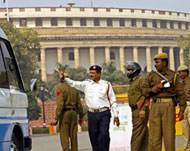Indian parliament expels 11 MPs
India’s parliament has ended its winter session with a vote to expel 11 MPs who were caught taking bribes in a sting operation.

The lower house voted on Friday to expel 10 legislators and the upper house expelled one member, the first time that body, known as the Rajya Sabha, has expelled one of its own.
The powerful lower house, or Lok Sabha, has not removed a member since 1951.
The 11 legislators belonging to different political parties, were shown on the independent Aaj Tak television channel earlier this month accepting cash from journalists who posed as representatives of a fictitious lobbying group.
The vote follows the findings of a five-member committee appointed by the speaker of the lower house which ruled that the conduct of the legislators was “unethical” and they should not be allowed to continue as members of parliament.
Pranab Mukherjee, the Indian defence minister, said: “The expulsion is not a matter of legality but that of our conscience.”
Painful decision
“It was a painful decision but will vindicate the dignity of our sovereign parliament.
The televised vote was unanimous in favour of the expulsion after the main opposition Bharatiya Janata Party walked out in the run-up to the ballot, saying the punishment was too harsh and did not match the offence.
LK Advani, the BJP leader, said:
 |
|
The expelled MPs were caught on |
“It was unbecoming conduct on part of the involved members. But this kind of punishment is unjustified.”
Six of the MPs are from his party.
Chhattrapal Singh Lodha, another BJP member, made history by becoming the first Rajya Sabha member to be expelled.
However, some questioned the legality of the expulsion.
Ram Jethmalani, a former BJP law minister, told the Press Trust of India news agency: “The term of a Rajya Sabha member is fixed and there is no provision in the constitution that allows for shortening that term.”
The journalists paid the politicians between 15,000 Indian rupees ($325) and 110,000 Indian rupees ($2,400) to submit more than 60 questions to the parliament’s selection process.
Public interest
The TV station working along with a website, Cobrapost, said they were trying to expose corruption.
At least 25 of the questions were accepted and put to various ministers and government officials, Cobrapost reported.
Most of the questions dealt with small business issues, though some queries related to public interest matters, such as the investigation into the stock market crash in 2004, Cobrapost said.
The probe committee’s report, presented to parliament on Thursday, said although its recommendation of expulsion was “harsh, the continuance of these members as members of [parliament] will be untenable”.